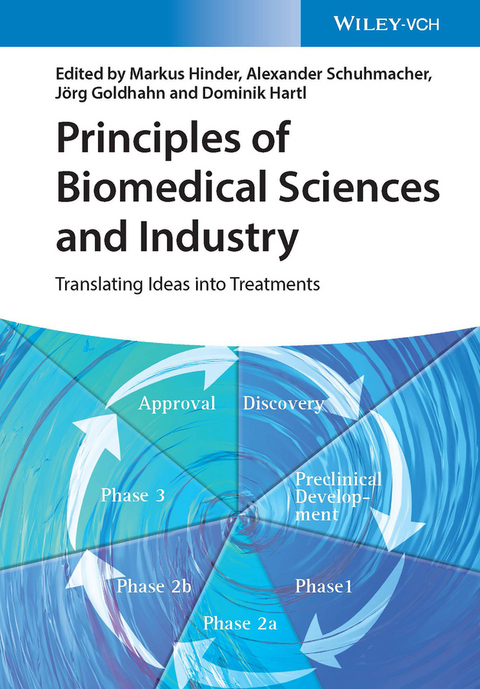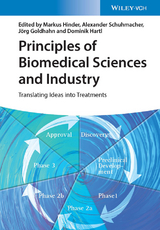Principles of Biomedical Sciences and Industry
Wiley-VCH (Verlag)
978-3-527-34571-7 (ISBN)
This practical guide to four major areas within the biomedical industry (pharmaceuticals, diagnostics, biomaterials, medical devices) covers the entire product lifecycle, from translating a scientific result into a prototype to product launch and portfolio management.
Developing innovative healthcare products such as biodegradable implants, biopharmaceuticals, or companion diagnostics, requires a multi-disciplinary effort that translates scientific evidence and innovative ideas into new and improved products. In order to understand and master this process, a broad knowledge of strategies and best practices for biomedical product development is required.
Providing a fundamental understanding of the process by which innovative biomedical products are developed, this practice-oriented guide combines the experience from four major areas within the biomedical industry: pharmaceuticals, diagnostics, biomaterials, medical devices.
It covers the entire product lifecycle, from translating a scientific finding into a prototype to product launch and portfolio management. Case studies from different biomecial product types, including combination products, illustrate the general principles and translate them into everyday practice.
This guide is aimed at advanced students and young professionals pusuing a career in the biomedical and healthcare industries and a great supplementary resource for biomedical science and technology courses.
- Advance your career: Product development and other business-related aspects have become key enabling skills for scientists working in the pharma, biotech and medtech industries.
- Great teaching tool: Excellent supplementary material for a growing number of biomedical science and bioengineering degree programs, which aim to prepare their students for a career in the biomedical industry.
- Learn from practical examples: Contains several case studies from the most important product categories (pharmaceuticals, diagnostics, medical devices, combination products).
Prof. Dr. Markus Hinder studied medicine at the Universities of Heidelberg, Paris and Zürich and obtained a doctoral degree in pharmacology from Heidelberg University. After graduation he trained in clinical pharmacology, cardiology and emergency medicine. He underwent postgraduate training in clinical trial methodology and statistics at the Universities of Basel and Brussels. He joined the pharmaceutical industry more than 20 years ago and held senior leadership positions in clinical pharmacology, translational medicine, clinical development, medical affairs and project management. He has been lecturing pharmacology and pharmaceutical R&D since 2004. In 2010 he was appointed professor at Cardiff University/ Hochschule Fresenius. He serves as a reviewer for several journals and associate editor for the Journal of Translational Medicine.
Prof. Dr. Alexander Schuhmacher graduated in biology from the University of Konstanz (Germany), in pharmaceutical medicine at the University of Witten/Herdecke (Germany) and did a Ph.D. in molecular biology at the University of Konstanz; he is also a graduate of the Executive MBA program at the University of St. Gallen (Switzerland). Alexander holds a full professorship in life science management at the Technische Hochschule Ingolstadt (Germany). His research focus is on biopharmaceutical innovation management with a specialization on R&D efficiency, artificial intelligence and open innovation. Prior to that, Alexander worked 9 years as professor at Reutlingen University (Germany) and 14 years in various R&D leadership positions in the pharmaceutical industry.
Prof. Dr. Jörg Goldhahn received his M.D. 1997 from the Friedrich-Schiller University in Jena, Germany, finished a postgraduate course (MAS) in Medical Physics and Biomechanics at the ETH Zurich in 2000, received the postdoctoral lecture qualification (Habilitation) in 2008 and became a faculty member of the department for health sciences and technology (D-HEST) as adjunct professor 2014. He worked as a translational medicine expert at the Novartis Institutes for Biomedical Research (NIBR) in Basel in addition to more than 15 years in clinical research. He is currently the head of the Institute for Translational Medicine and medical director of the bachelor in medicine at ETH in Zurich, Switzerland.
Dominik Hartl studied Medicine at the Universities of Regensburg, Munich and Melbourne and obtained his doctoral degree in Immunology from Munich/LMU University. He is board certified in Pediatrics and Infectious Diseases and worked as Physician Scientist/Post-Doc Scholar at Yale University. He joined the pharmaceutical industry more than 6 years ago and gained extensive experience in his positions in Drug Discovery, Translational Medicine, Biomarkers and Precision Medicine/Personalized Healthcare in Biotech and Big Pharma. In addition to working in the pharmaceutical industry, Dominik is a Professor for Pediatric Immunology/Infectious Diseases at the University of Tübingen.
Biopharmaceutical Innovation at a Glance
Pharmacology and Drug Targets - The Basis of Therapeutics
Principles and Methods of the Pharmaceutical Drug Discovery Process - From Idea over Target to a Development Candidate
Biomarkers - Definitions and Utility for Drug Development
Toxicology and Managaing Safety and Risks
Introduction to Chemistry Manufacturing and Controls - From Compound and Development Candidate to Drug
Translational Medicine - The Bridging Discipline: Role and Tools in the Drug Development Process
Decision-Making - What Are the Key Drivers Around Decision-Making in Drug Development?
Clinical Drug Development - Clinical Characterization for Regulatory Approval
Regulatory Affairs - Communicating with Health Authorities
Regulatory Affairs in Device Development - How to Design Medical Devices Capable to Enter the Market
Market Entry and Reimbursement - Making Drugs Available for Patients After Drug Approval
Pricing in Germany - Key Learnings for Optimising Price Potential After the Introduction of AMNOG
Project, Risk and Portfolio Management - Managing R&D Project Costs and Risks
Intellectual Property - How to Protect Innovation in the Biopharmaceutical Industry
Patents in the Biomedical Sciences and Industry - The Case of Swiss Life Science Company Prionics
Pharmaceutical Business Development & Licensing - Overview of a Cross-functional and Multifaceted Role and Its Key Elements in Biopharmaceutical Industry
The Entrepreneur's Guide Through the Galaxy of Biotech Funding
Medical Technologies - Key Learning from Two Case Studies
Diagnostics - Tools for Clinical Decision Making and Clinical Trial Endpoints
Vaccination - Towards an Improved Influenza Vaccine
| Erscheinungsdatum | 23.07.2020 |
|---|---|
| Verlagsort | Weinheim |
| Sprache | englisch |
| Maße | 170 x 244 mm |
| Gewicht | 978 g |
| Einbandart | gebunden |
| Themenwelt | Medizin / Pharmazie ► Medizinische Fachgebiete ► Biomedizin |
| Medizin / Pharmazie ► Pharmazie | |
| Naturwissenschaften ► Biologie | |
| Naturwissenschaften ► Chemie | |
| Schlagworte | Biomedizin • Biotechnologie • Biotechnologie i. d. Biowissenschaften • Biotechnology • Biowissenschaften • Business & Management • Business & Management • Chemie • Chemistry • Creativity & Innovation Management • Creativity & Innovation Management • Innovations- u. Kreativitätsmanagement • Life Sciences • Pharmaceutical & Medicinal Chemistry • Pharmaceutical & Medicinal Chemistry • Pharmazeutische u. Medizinische Chemie • Wirtschaft u. Management |
| ISBN-10 | 3-527-34571-X / 352734571X |
| ISBN-13 | 978-3-527-34571-7 / 9783527345717 |
| Zustand | Neuware |
| Informationen gemäß Produktsicherheitsverordnung (GPSR) | |
| Haben Sie eine Frage zum Produkt? |
aus dem Bereich




